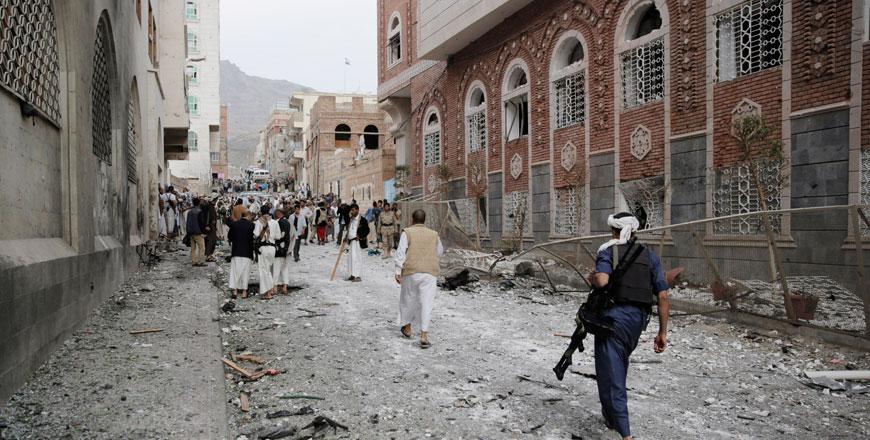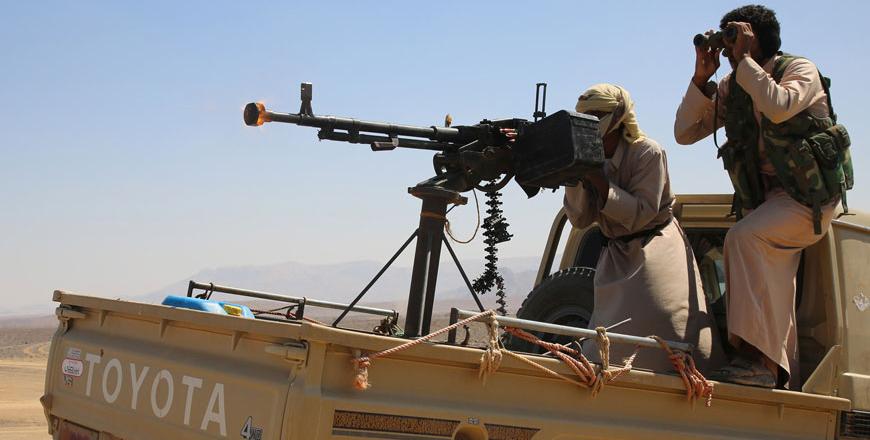You are here
Loyalists retake Yemen's biggest air base
By AFP - Aug 04,2015 - Last updated at Aug 04,2015
ADEN — Pro-government forces backed by a Saudi-led coalition retook Yemen's biggest air base from Iran-backed rebels on Tuesday in a significant new gain after recapturing second city Aden last month.
Their seizure of Al Anad base in a 24-hour assault using heavy armour supplied by the coalition came after hundreds of Gulf Arab troops landed in Aden to bolster the loyalist fightback.
Hailing victory in the battle for Al Anad, the defence ministry vowed no let-up in the war against the Shiite Houthi rebels and their allies until the authority of exiled President Abed Rabbo Mansour Hadi was restored over the whole country.
The air base, 60 kilometres north of Aden, is strategically located on the main road north towards both the battleground third city of Taez and rebel-held capital Sanaa.
The vast complex housed US troops overseeing a drone war against Al Qaeda in Yemen until shortly before the rebels overran it in March.
Its loss is a major blow to the insurgents, whose leader Abdulmalik Al Houthi claimed just Sunday that their ouster from Aden after four months of ferocious fighting was merely a “short-term” setback that would be reversed.
The loyalists swiftly pushed on from Al Anad on Tuesday, attacking the rebel-held Labouza army camp 10 kilometres further north, military sources said.
To the south, pro-government forces also advanced on Huta, the capital of Lahj province, and retook several public buildings and the marketplace, the sources added.
Pro-government sources said that the rebels lost 70 dead and 10 captured in the fighting for Al Anad.
The loyalists suffered 24 dead and 23 wounded.
Coalition troops on the ground
Officers who took part in the assault said the rebels had put up “stiff resistance” but that Saudi-led air strikes had helped destroy their armour.
An AFP correspondent saw columns of coalition-supplied tanks and artillery pounding the base’s defences.
They were accompanied by large numbers of southern militiamen who formed the core of the resistance to the rebels before the deployment of reinforcements trained and equipped in Saudi Arabia.
The recapture of Al Anad is a major boost for the defence of Aden and paves the way for a possible return by the exiled government to the southern port which was its last refuge before it fled into exile in neighbouring Saudi Arabia in March.
On Sunday, hundreds of Gulf Arab troops from the coalition entered Aden with tanks and other armour “to help secure” it.
The Saudi-owned Al Hayat newspaper said 1,500 troops, mostly from the United Arab Emirates, had deployed there.
Aden has been devastated by four months of coalition air strikes and fighting on the ground.
Health services ‘nearing collapse’
Unexploded ordnance and booby-traps planted by the retreating rebels still pose a daily threat to civilians.
Medics said Tuesday that at least 18 had been killed and dozens wounded in the previous 24 hours alone.
Doctors Without Borders (MSF) warned that the country’s health services were “nearing collapse”, with acute shortages of food, medicine and health workers.
“The population is faced with food shortages, the health system is in a state of collapse. I have never seen such a level of violence,” MSF’s Aden coordinator Thierry Goffeau said in Paris.
The United Nations says the war has killed nearly 4,000 people, half of them civilians, while 80 per cent of the 21-million population needs aid and protection.
Nearly 100,000 Yemenis have fled abroad since late March, the UN refugee agency says.
Despite losing Aden, the Houthis and their allies still control large swathes of Yemen, including Sanaa which they overran last September.
The United Nations has called repeatedly for a ceasefire and hosted peace talks in Geneva in June.
But the talks collapsed without the warring parties ever sitting down in the same room.
The exiled government said it would only discuss the rebels’ withdrawal from all of the territory they have seized, in line with a resolution adopted by the UN Security Council in April.
The rebels said they could not pull out as that would create a security vacuum that would expose them to jihadist attack.
Sunni extremists of both Al Qaeda and the Daesh terror group have attacked the Shiite rebels and their supporters, whom they regard as apostates.
On Tuesday, the UN said the Arab League had indicated it would consider sending peace monitors to Yemen if a ceasefire was agreed.
Related Articles
ADEN — Loyalist forces began a major offensive Monday aimed at retaking Yemen's largest air base which is held by rebels, as troops from the
ADEN — Iran-backed rebels retook positions in southern Yemen in a bid to advance on second city Aden, military sources said Sunday as a land
ADEN — Pro-government forces pursued fleeing Shiite Houthi fighters in south Yemen Wednesday, military sources said, as they looked to press













